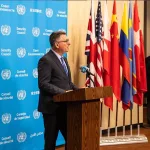Mosquitoes captured by the Ministry of Environmental Protection have been identified by Ministry of Health laboratories as infected with the West Nile Virus
Ministry of Environmental Protection captures West Nile Virus-infected mosquitoes in Eilat, Ministry of Health confirms human case in Israel.
The Ministry of Environmental Protection and the Ministry of Health are updating the public that during a monitoring operation, the Ministry of Environmental Protection captured mosquitoes in Israel.com/breaking-only/israeli-astronaut-eytan-stibbe-appointed-chancellor-of-international-space-university/” class=”auto-internal-link”>Israel.com/security/israel-destroys-houthi-infrastructure-in-hodeidah-port/” class=”auto-internal-link”>Eilat that were subsequently identified by Ministry of Health laboratories as carriers of the West Nile Virus.
In addition, the Ministry of Health reports one confirmed human case of West Nile Fever from central Israel since the beginning of the year. The Ministry of Environmental Protection has instructed local authorities across Israel – with particular emphasis on the authority where infected mosquitoes were found and those where the Ministry of Health has reported human morbidity from West Nile Fever – to further intensify their monitoring and pest control efforts.
Dr. Shay Reicher, Head of the Pest Control Division at the Ministry of Environmental Protection: “As part of the extensive and routine monitoring activities carried out by the Ministry of Environmental Protection throughout the year, mosquitoes carrying the West Nile Virus were captured in Eilat. This marks the second detection of virus-carrying mosquitoes this year, with the previous case reported in June in the Eilot Regional Council. In response to these monitoring results and the Ministry of Health’s report of a human case of the disease, the Ministry of Environmental Protection has instructed the relevant local authorities to intensify their prevention, monitoring, public awareness, and pest control efforts. We urge the public to take protective measures against mosquitoes in accordance with the Ministry’s guidelines to reduce the risk of being bitten by virus-carrying mosquitoes. The cooperation of all parties is essential to drain and treat mosquito breeding grounds, reduce their population, and thereby prevent unnecessary bites and illness.”
Dr. Oren Shetach-Ketavi, Head of the Department of Zoonotic Diseases in the Public Health Division at the Ministry of Health: “A patient was confirmed with West Nile Fever during testing conducted at the Central Virology Laboratory. West Nile Fever is a zoonotic disease, meaning it originates in animals and can be transmitted to humans. It is caused by a virus found primarily in birds and is transmitted to humans and various animals through the bite of mosquitoes that have fed on infected birds. It’s important to note that most people infected with West Nile Virus do not develop symptoms. Symptoms appear in approximately 20% of those infected, with varying degrees of severity, including fever, general malaise, headaches, or widespread body aches. Neurological complications occur in a minority of cases, with the elderly age group being at increased risk.”
The Pest Control Division at the Ministry of Environmental Protection conducts thousands of mosquito larvae monitoring operations in water sources and hundreds of adult mosquito captures throughout the year. The mosquitoes are then transferred to Ministry of Health laboratories for identification and testing. The Ministry of Environmental Protection is calling on local authorities to refresh the guidelines provided to residents. This will help them prevent mosquito development in residential areas.
Recommended Actions
To avoid mosquito bites and mitigate mosquito-related nuisances, the Ministry of Environmental Protection recommends that the public drain and dry out stagnant water sources that can serve as mosquito breeding grounds, including:
- Locate, remove, puncture or turn over any container that may accumulate water such as old tires, buckets and barrels
- Prevent water from accumulating at the bottoms of pots and planters
- Empty or change water at least once a week in containers such as flower vases and pet drinking bowls
- Cover swimming pools
- Ensure the presence of fish in ornamental ponds
- Clean and empty gutters
Additionally, the Ministry of Environmental Protection and the Ministry of Health recommend that the public take protective measures against mosquito bites:
- Use insect repellents on the body and in living quarters
- Reduce areas of exposed skin by wearing long, light-colored clothing
- Use fans indoors and outdoors as needed.
- Install nets and close windows and openings to prevent mosquitoes from entering your living and resting areas.
The Ministry of Environmental Protection encourages the public to contact their local municipal hotline (*106) in any local authority area where a mosquito nuisance is discovered. Residents should report sewage overflows, standing water, and mosquito nuisances in public areas.























